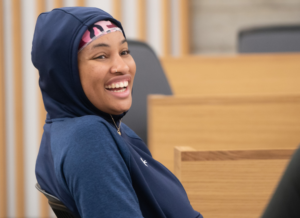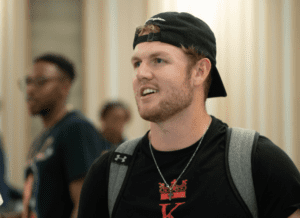EMBA Immersions: Unrivaled Access, Unanticipated Growth
SCHOOL NEWS
Haas News

“Classified” is an occasional series spotlighting some of the more powerful lessons being taught in classrooms around Haas.
On a recent Monday evening Berkeley Haas Lecturer Kellie McElhaney opened her class with a challenge, asking her students how others have defined them. “Too bossy” and “too sensitive” were among the responses that McElhaney quickly urged them to dismiss or proudly own as they began a journey of how to describe themselves.
“What do you want your brand to be?” she asked the class of 48 students, most of them Cal athletes—a group that’s at the heart of her new class, Equity Fluent Leadership & Personal Brand. It’s designed to teach primarily Cal student athletes and undergraduates how to create personal brands.
This class comes after California and eight other states passed laws in 2019 that allowed college athletes to benefit from their names, images, or likenesses (NIL). In July 2021, the NCAA followed suit and adopted its own NIL policy for all college athletes. Similar to professional athletes, college athletes can now engage in sponsorships and receive cash payments and gifts. However, the policy continues to preclude students from entering pay-for-play contracts with colleges and universities.
“The NIL policy is in its infancy right now and many college athletes haven’t fully grasped the policy in its entirety,” said McElhaney, who’s also the founding executive director of the Center for Equity, Gender and Leadership. “My hope is that I can give students the tools to discover who they are and what they stand for, regardless of whether or not they enter contracts.”
The Equity Fluent Leadership & Personal Brand class has drawn the interest of many athletes, including Cal football players, swimmers, and gymnasts, five of whom are Haas students. Non-Haas students are also enrolled in the course.

“This class has really re-energized me,” McElhaney said. “It’s bringing my three passions together: Equity Fluent Leadership, Cal athletics, and the love for my dad, my role model.” (McElhaney’s father, Harold “Hal” McElhaney, played football for the Philadelphia Eagles, coached at Duke, and went on to become the athletic director for Allegheny College and Ohio University.)

In addition to crafting their personal brands, students explore their core values based on their social identities, learn about the power of allyship, and discover their own brand of leadership. Throughout the semester, students have been tasked with giving presentations about leaders whom they admire, finding songs to represent the soundtrack of their lives, and designing social media accounts that reflect their brands.
Cal women’s basketball player Jazlen Green, BA 22, (sociology) has already benefited from the NIL policy, serving as a brand ambassador for compression legging company Stoko. In exchange for using Green’s name and image, Stoko gives the Cal basketball player free products. But her primary motivation for taking McElhaney’s class was to be the best version of herself.
The personal brand hero assignment, which required students to write about a leader who reflects their brand, has been the most impactful exercise, she said.
“I had a hard time narrowing my decision to one person, which highlighted the fact that I’m multifaceted,” Green said. “I am an athlete, a student, a Black female, and a creator.”
Cal baseball player Garret Nielsen, BS 22, said he took the class to learn more about himself and to become more empathetic.

“This class asks the hard questions,” Nielsen said. “The most important lesson that this class has taught me is you have to establish a foundation of who you are before success comes.”
Conversely, Nielsen said he’s not interested in benefiting from the NIL policy. He’d rather use his status and expertise to help children become great baseball players.
“I would have been ecstatic if a college player had helped me with my game when I was a kid,” Nielsen said. “I now have the opportunity to do just that. I think that’s the true gift of being a Cal athlete.”
Over time, McElhaney hopes to expand the class to include topics such as how to read contracts, money management, and investing. She wants to bring in lawyers and more professional athletes as guest speakers. Earlier in the semester, she invited former NFL player Lorenzo Alexander to talk about the value of having a board of directors. She’s also tapped the wisdom of her graduate student instructor André Chapman, Jr., a former UCLA 400-meter hurdler who was bound for the 2020 Tokyo Olympics.
“At its heart, this is a leadership class,” McElhaney said. “Whether or not students, specifically my student athletes, enter sponsorships, this course sets them up for life.”
Posted in:
Topics: